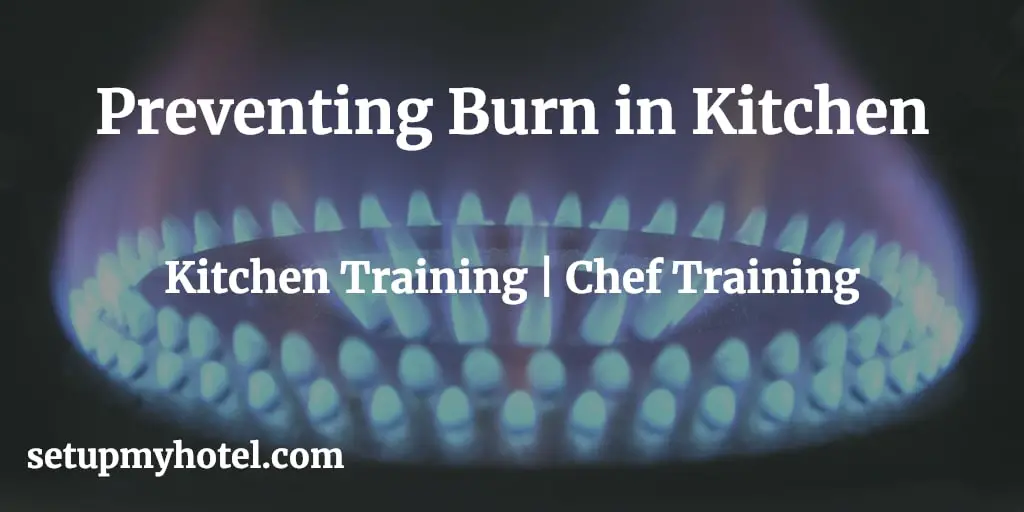How to prevent burn in the hotel kitchen?
Understanding the transfer of heat is very important to chefs working in the kitchen area, It is this movement of heat from one surface or product to another that determines the quality of the product produced in the kitchen. Working with heat should be dealt with utmost care to prevent burn injuries while working in the kitchen area.
Before starting the work make sure to check the condition of all the working equipment especially those that can potentially cause a burn or fire. Ensure that their conditions are appropriate and the fire extinguishers are easily reachable.
Preventing burns in a hotel kitchen is crucial for maintaining a safe and efficient working environment. Here are some essential tips to help prevent burns:
1. Wear Proper Attire:
- Always wear appropriate kitchen attire, including chef jackets, aprons, and non-slip shoes. Avoid loose clothing that could easily catch fire.
2. Use Oven Mitts and Pot Holders:
- When handling hot pots, pans, or baking sheets, always use oven mitts or pot holders. Ensure they are dry and in good condition to provide effective protection.
3. Be Mindful of Hot Surfaces:
- Be aware of hot surfaces such as stovetops, grills, ovens, and griddles. Use caution when working around these areas and avoid placing items on hot surfaces unintentionally.
4. Handle Hot Utensils Safely:
- Use tongs or other appropriate utensils when handling hot items, and be cautious not to touch hot surfaces with your hands.
5. Turn Pot Handles Inward:
- When cooking on stovetops, turn pot and pan handles inward to prevent accidental bumps and spills. This reduces the risk of someone walking by and knocking a hot pot off the stove.
6. Use Back Burners:
- Whenever possible, use back burners first. This helps reduce the risk of accidentally touching or bumping into hot pots and pans on the front burners.
7. Avoid Overcrowding:
- Avoid overcrowding the kitchen workspace. Maintain clear pathways and organized workstations to prevent accidental collisions and spills.
8. Be Cautious with Steam:
- Steam can cause burns. Open pot lids away from you to allow steam to escape safely, and use caution when opening steam ovens or other cooking appliances.
9. Attend to Grease and OilSeveral kinds of oil are used to make salad dressing;e.g. olive; peanut; sunflower; walnut; grape se... Carefully:
- Be cautious when working with hot grease and oil. Use splash guards and carefully lower food items into hot oil to prevent splatters.
10. Know Emergency Procedures:
- Familiarize yourself with the location of fire extinguishers, fire blankets, and emergency exits. Know the proper procedures for handling kitchen fires.
11. Use Cutting Boards and SafetySafety is a condition in which persons are safe from injury; hurt; or loss while present in the work... Aids:
- Use cutting boards to protect surfaces from hot pans and ensure safety aids, such as anti-slip mats, are in place to prevent slips and falls.
12. Keep First Aid Supplies Available:
- Have a well-stocked first aid kit in the kitchen to promptly address minor burns or injuries. Train kitchen staff on basic first aid procedures.
13. Educate Staff:
- Provide training to kitchen staff on burn prevention, proper handling of hot equipment, and emergency response procedures.
14. Report and Address Hazards:
- Report any damaged or malfunctioning equipment immediately. Address potential hazards to prevent accidents.
15. Regular Equipment Maintenance:
- Ensure that kitchen equipment is regularly inspected and properly maintained. Malfunctioning equipment can pose a risk of burns.
Preventing Burns While working in the Kitchen:
- Always assume a pot handle is hot do not just grab it with bare hands.
- Use dry pads or towels to handle hot pans wet ones will create steam which can burn you.
- Keep the panhandle out of the fire so people will not accidentally bump into them.
- Also, keep the handle away from the open flame of gas burns
- Be careful when moving heavy containers of hot food. It would be better if you get help.
- Open lids away from you to let steam escape safely.
- Use can openers when opening compartment steamers.
- Make sure gas is well-vented before trying to light ovens or turn off lights.
- Strike matches before turning on the gas but do so in a safe distance.
- Clear long sleeves and a double-breasted jacket to protect from a spill or spattered hot food or fat.
- Keep the stovetop and oven clean; grease and debris buildup can ignite easily.
- Keep stove area clear of flammable materials, including oven mitts, and paper or cloth towels.
- Always use sturdy leather shoes with closed toes.
- Dry food before putting it in frying fat (or hot fat may splatter on you.)
- When placing foods in hot fat, let them fall away from you so that fat will not splash on you.
- Always warn people when you are walking behind them with hot pans, or when you are walking behind someone who is working with hot items.
- Warn services people about hot plates.
- Never leave cooking unattended.
- Dishtowels should never be hung on the oven door.
- Use only containers designed for microwave use.
- Allow food to cool before removing it from the microwave.
- Never leave food unattended on the stove.
By incorporating these safety practices into daily operations and promoting a culture of awareness and prevention, hotels can significantly reduce the risk of burns in the kitchen. Regular training and open communication are key components of a safe kitchen environment.











